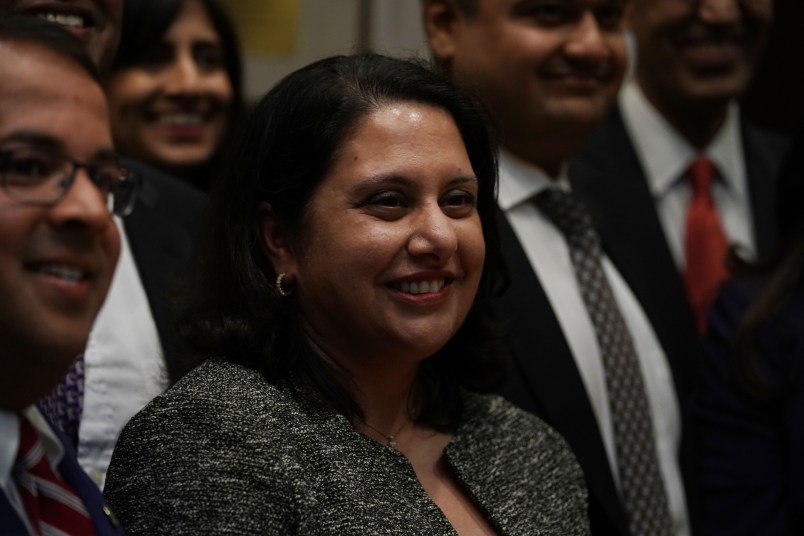As a panel of three appeals court judges interrogated attorneys for the House and President Trump over a congressional subpoena to his accounting firm, one of the trio stood apart in the level of her skepticism towards the House.
That was D.C. circuit judge Neomi Rao, who sparred with House of Representatives General Counsel Douglas Letter at oral arguments on Friday.
Rao, a Trump appointee who survived a controversial confirmation battle in March, homed in on the question of whether Congress could legitimately investigate a president on the basis of a single committee with delegated powers, and not on the basis of a full House or Senate vote.
Rao asked Letter “what evidence there is” that the House of Representatives has “authorized the committee to take this action?”
Rao was referring to a subpoena sent by the House Oversight Committee to Mazars USA LLP, the President’s longtime accountant. Trump took the unprecedented step of hiring personal attorneys to sue Mazars in a bid to block it from complying with the subpoena.
But the precedent that apparently caught Rao’s interest was that of procedural issues within Congress.
The House has not yet voted to authorize an impeachment inquiry. Nor has it set up a specific committee to investigate Trump. Nor has it held a vote among all its members regarding an investigation of the President.
“I don’t think we’ve ever encountered before an argument that Congress cannot do an oversight investigation of the Executive Branch,” Letter told Rao at the hearing, emphasizing that the House had not subpoenaed Trump himself. Rather, it subpoenaed Mazars, a third party custodian of records that concern Trump.
But at the hearing, Rao appeared unconvinced.
“Is there any limitation on the ability of the House to delegate its power to a single committee?” she asked. “Could they delegate the full authority of the House to a single committee?”
Rao, whose questioning came off as thoughtful and engaged, repeatedly stated that it may be “unprecedented” for the House to investigate a sitting president without the authorization granted by a full vote of its members.
Letter began to reach for an example at one point, citing a committee that the House established during the Civil War to oversee the Executive Branch’s handling of the conflict.
Rao then interrupted Letter, saying that the committee in question never subpoenaed President Lincoln.
Letter emphasized that it was not “a subpoena to the President.”
But Rao appeared unswayed, saying that “you can’t provide any specific example” of the committee exercising “compulsory process against the President.”
Rao stayed relatively quiet for most of the arguments from the President’s side, throwing a few softballs at Trump personal attorney William Consovoy.
At one point, however, she appeared to throw in a question that had the potential to completely demolish Consovoy’s argument that all of Congress’s statements about enacting legislation related to the Trump investigation are a “ruse” meant to cover for its true purpose: a law enforcement action against The Donald.
Rao asked Consovoy how he made that argument without asking the court to conduct a “search for motive” – a red line in the law that “both parties agree is impermissible.”
Consovoy dodged.






